I've just upgraded to xcode 4.0 and I can no longer deploy to iPhone, I get a Apple Mach-O Linker Error, it still works for the simulator though.
Ld /Users/yveswheeler/Library/Developer/Xcode/DerivedData/iParcel-fkeqjcjcbbhjwhdssjptkdxzzzxh/Build/Intermediates/iParcel.build/Debug-iphoneos/iParcel.build/Objects-normal/armv7/iParcel normal armv7
cd /Users/yveswheeler/iParcel
setenv IPHONEOS_DEPLOYMENT_TARGET 3.2
setenv PATH "/Developer/Platforms/iPhoneOS.platform/Developer/usr/bin:/Developer/usr/bin:/usr/bin:/bin:/usr/sbin:/sbin"
/Developer/Platforms/iPhoneOS.platform/Developer/usr/bin/g++-4.2 -arch armv7 -isysroot /Developer/Platforms/iPhoneOS.platform/Developer/SDKs/iPhoneOS4.3.sdk -L/Users/yveswheeler/Library/Developer/Xcode/DerivedData/iParcel-fkeqjcjcbbhjwhdssjptkdxzzzxh/Build/Products/Debug-iphoneos -F/Users/yveswheeler/Library/Developer/Xcode/DerivedData/iParcel-fkeqjcjcbbhjwhdssjptkdxzzzxh/Build/Products/Debug-iphoneos -filelist /Users/yveswheeler/Library/Developer/Xcode/DerivedData/iParcel-fkeqjcjcbbhjwhdssjptkdxzzzxh/Build/Intermediates/iParcel.build/Debug-iphoneos/iParcel.build/Objects-normal/armv7/iParcel.LinkFileList -dead_strip -all_load -ObjC -lxml2 -miphoneos-version-min=3.2 -framework UIKit -framework CoreGraphics -framework QuartzCore /Users/yveswheeler/Library/Developer/Xcode/DerivedData/iParcel-fkeqjcjcbbhjwhdssjptkdxzzzxh/Build/Products/Debug-iphoneos/libThree20.a /Users/yveswheeler/Library/Developer/Xcode/DerivedData/iParcel-fkeqjcjcbbhjwhdssjptkdxzzzxh/Build/Products/Debug-iphoneos/libThree20Core.a /Users/yveswheeler/Library/Developer/Xcode/DerivedData/iParcel-fkeqjcjcbbhjwhdssjptkdxzzzxh/Build/Products/Debug-iphoneos/libThree20Network.a /Users/yveswheeler/Library/Developer/Xcode/DerivedData/iParcel-fkeqjcjcbbhjwhdssjptkdxzzzxh/Build/Products/Debug-iphoneos/libThree20Style.a /Users/yveswheeler/Library/Developer/Xcode/DerivedData/iParcel-fkeqjcjcbbhjwhdssjptkdxzzzxh/Build/Products/Debug-iphoneos/libThree20UI.a /Users/yveswheeler/Library/Developer/Xcode/DerivedData/iParcel-fkeqjcjcbbhjwhdssjptkdxzzzxh/Build/Products/Debug-iphoneos/libThree20UICommon.a /Users/yveswheeler/Library/Developer/Xcode/DerivedData/iParcel-fkeqjcjcbbhjwhdssjptkdxzzzxh/Build/Products/Debug-iphoneos/libThree20UINavigator.a -framework AddressBook -lz.1.2.3 -framework Foundation -framework CFNetwork -framework MobileCoreServices -framework SystemConfiguration -framework MessageUI -framework AudioToolbox -o /Users/yveswheeler/Library/Developer/Xcode/DerivedData/iParcel-fkeqjcjcbbhjwhdssjptkdxzzzxh/Build/Intermediates/iParcel.build/Debug-iphoneos/iParcel.build/Objects-normal/armv7/iParcel
arm-apple-darwin10-g++-4.2.1: /Users/yveswheeler/Library/Developer/Xcode/DerivedData/iParcel-fkeqjcjcbbhjwhdssjptkdxzzzxh/Build/Products/Debug-iphoneos/libThree20.a: No such file or directory
arm-apple-darwin10-g++-4.2.1: /Users/yveswheeler/Library/Developer/Xcode/DerivedData/iParcel-fkeqjcjcbbhjwhdssjptkdxzzzxh/Build/Products/Debug-iphoneos/libThree20Core.a: No such file or directory
arm-apple-darwin10-g++-4.2.1: /Users/yveswheeler/Library/Developer/Xcode/DerivedData/iParcel-fkeqjcjcbbhjwhdssjptkdxzzzxh/Build/Products/Debug-iphoneos/libThree20Network.a: No such file or directory
arm-apple-darwin10-g++-4.2.1: /Users/yveswheeler/Library/Developer/Xcode/DerivedData/iParcel-fkeqjcjcbbhjwhdssjptkdxzzzxh/Build/Products/Debug-iphoneos/libThree20Style.a: No such file or directory
arm-apple-darwin10-g++-4.2.1: /Users/yveswheeler/Library/Developer/Xcode/DerivedData/iParcel-fkeqjcjcbbhjwhdssjptkdxzzzxh/Build/Products/Debug-iphoneos/libThree20UI.a: No such file or directory
arm-apple-darwin10-g++-4.2.1: /Users/yveswheeler/Library/Developer/Xcode/DerivedData/iParcel-fkeqjcjcbbhjwhdssjptkdxzzzxh/Build/Products/Debug-iphoneos/libThree20UICommon.a: No such file or directory
arm-apple-darwin10-g++-4.2.1: /Users/yveswheeler/Library/Developer/Xcode/DerivedData/iParcel-fkeqjcjcbbhjwhdssjptkdxzzzxh/Build/Products/Debug-iphoneos/libThree20UINavigator.a: No such file or directory
Command /Developer/Platforms/iPhoneOS.platform/Developer/usr/bin/g++-4.2 failed with exit code 1


